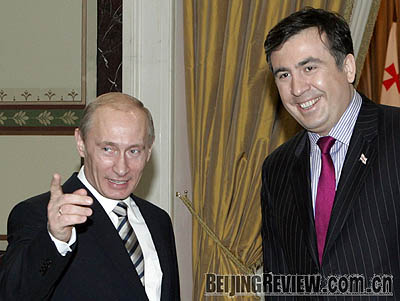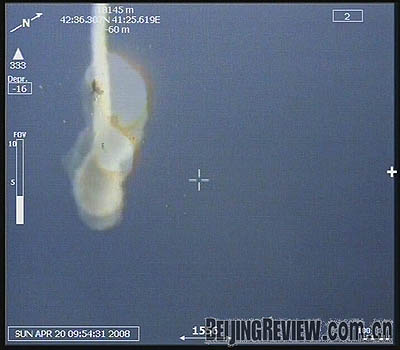|

MAKING CHOICES: Russian President Vladimir Putin talks with Georgian President Mikheil Saakashvili in Minsk, Belarus, during the Commonwealth of Independent States leaders’ meeting on February 22
XINHUA
The strained relationship between Georgia and Russia stretched tight since the launch of the "Rose Revolution" in 2003 came close to recent breaking point. On April 20, the Georgian Government reported that a Russian fighter had shot down one of its unmanned spy planes flying over the Georgian breakaway province of Abkhazia. Russia was quick to deny the charges and Abkhaziai took the blame for the attack. Georgia fumed.
Four days prior, Russia announced on April 16 that it would offer material aid to citizens in the Georgian autonomous regions of South Ossetia and Abkhazia, and establish a mechanism to protect the freedom and legal rights of Russian citizens in the two regions. This was seen as a partial recognition of Abkhazia and South Ossetia as independent states by Moscow. The sovereignty of these two regions is not recognized by the United Nations.
Experts on world affairs say Georgia's move for NATO membership is at the root of the current furore, a move that has left Russia enraged.
Why the tension?
The wedge in recent relations between Russia and Georgia goes back to 2003, when pro-Western Mikheil Saakashvili emerged as president of Georgia after the Rose Revolution, fueling tensions already existing between his country and Russia. Zhao Mingwen, a researcher from the China Institute of International Studies (CIIS), said there had been two fundamental reasons for the tensions.
First, Georgia's pro-Western stance is a choice that hurts Russia's national interests. Since the September 11 terrorist attack on the United States in 2001, the Bush administration has been trying to infiltrate the Central Asian regions, said Zhao. He said the United States had supported countries in this region and their "color revolutions," and tried to bring them into the Western fold. After the "Rose Revolution," the Georgian Government aligned itself closer to the United States and in the process distanced itself from Russia.
Zhao said during this period the United States led a NATO initiative to enlarge its presence in Europe. Georgia was involved during this initiative. The move has incensed Russia, which sees this as a constriction of its strategic space. Zhao said Georgia sought to join NATO in the hope of U.S. protection, while the United States wanted Georgia in the fold for strategic reasons.
At the Bucharest Summit held in early April, Georgia was not admitted as a NATO member, due to Russia's strong objection. NATO has, however, promised to resolve the membership issue before December. "Russia successfully blocked Georgia's NATO entry, but it can only hold back the process temporarily, not forever," said Zhao.
The second reason was the exemplary effect of Kosovo independence. Abkhazia is an autonomous republic under Georgian administration, and South Ossetia is an autonomous state of Georgia, both resting on Russia's southern border. In 1992, Abkhazia declared independence, however, it is not internationally recognized and while there has been ongoing tension with Georgia for the past 16 years, no serious military conflict has been recorded. Russia, desperate to counter the pro-West strategy of the Georgian Government, began developing ties with South Ossetia and Abkhazia, said Zhao.
After Kosovo announced independence, Russia complained that legitimizing Kosovo independence by the West would set a "bad example" for similar disputes. As Georgia quickened its pace to join NATO, Russia moved to reconsider its stand on independence requests from the two autonomous regions of Georgia. On March 6, Russia removed economic sanctions against Abkhazia and strengthened cooperation with it in the fields of economy and trade, social development, science and technology, information, culture and education. "Russia's diplomatic acknowledgement of the two regions can be treated as a retaliatory move targeting Georgia," Zhao said.

PRONE DOWN: Georgian military announces one of its unmanned spy planes was shot down by a Russian fighter on April 20. Russia denied the accusation
XINHUA/AFP
According to a report in People's Daily, political analysts said Russia's strengthening cooperation with Abkhazia and South Ossetia could be considered as political posturing and that Russia would not change its policy toward Georgia after the new Russian Government takes office in May. The report said Russia was sending a warning to Georgia about enhancing its military strength and improving further military cooperation with the West under the NATO framework.
| 